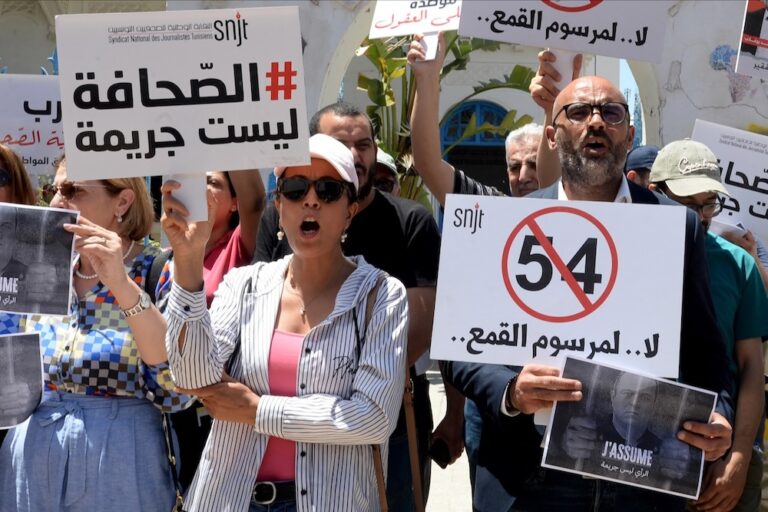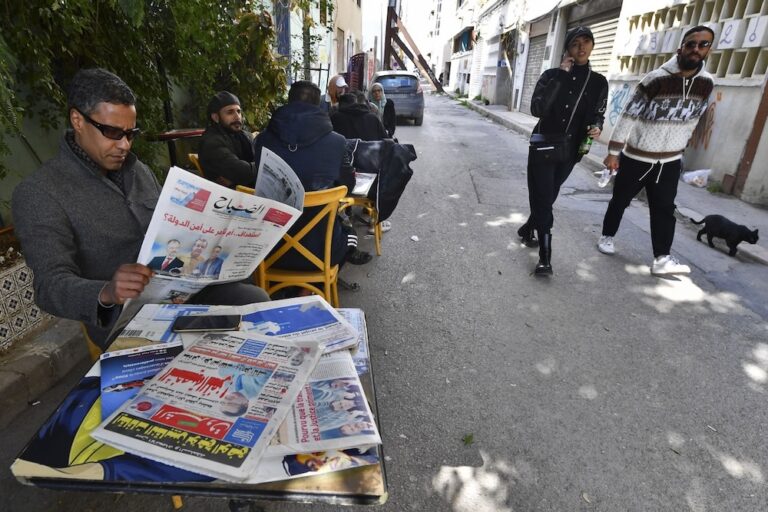A new Human Rights Watch report highlights the plight of labour, student and journalist unions that have criticised government policies.
(Human Rights Watch/IFEX) – Tunis, October 21, 2010 – The Tunisian authorities should end arbitrary restrictions on independent trade and student unions, Human Rights Watch said in a report released today. The government has refused to recognize independent unions, limited their ability to assemble peacefully, and unfairly prosecuted members, effectively shrinking the space in which unions can operate outside of government control. The government has denied such interference, but the facts contradict its rebuttals, Human Rights Watch said.
The 62-page report, “The Price of Independence: Silencing Labor and Student Unions in Tunisia,” documents Tunisian authorities’ tight system of control over unions and union activists, highlighting in particular the plight of labor, student, and journalist unions that have criticized government policies.
The government has refused to recognize unions that have followed the required registration procedure for legal status, prevented members from meeting and holding events, and arrested and arbitrarily detained union activists, some of whom allege that security forces tortured them. The government and its allies have also intimidated journalists and orchestrated the replacement of the leadership of the independent journalists’ union with a board consisting entirely of government allies.
“No realm of civil society in Tunisia is safe from government interference, not even trade unions, if they are considered critical of the government,” said Sarah Leah Whitson, Middle East and North Africa director at Human Rights Watch. “Using methods ranging from bureaucratic machinations to physical aggression, the Tunisian government is keeping Tunisia’s unions under its thumb.”
The appeal of one case of students expelled following a peaceful sit-in is scheduled for October 21, 2010, in the court of appeals in Monastir.
On October 6, the Tunisian government issued a detailed response to a memorandum on union activities submitted by Human Rights Watch. Human Rights Watch welcomes the government’s engagement on the issues raised in its report, as well as the government’s meetings with Human Rights Watch to discuss its findings. In its response, reprinted in full in the report, the government affirmed its respect for the right to freedom of association. It said that unions need only follow a notification procedure to register and that government approval is not required. It contended that unions that had not been recognized had never filed the required notifications.
The government also disputed Human Rights Watch’s characterization of the circumstances surrounding the removal of the independent journalists’ union’s board, and alleged that it had prosecuted and jailed student union activists for common crimes unrelated to their union activism.
The right of citizens to form unions freely and operate independent of government interference is secured in Tunisia’s Constitution and Labor Code. In practice, Human Rights Watch found that the government deprives independent unions of legal status by refusing to acknowledge receipt of their notification papers, including the Tunisian Journalists’ Union in May 2004 and the Tunisian General Confederation of Labor in February 2007. In both cases, the government claims that it has no knowledge of the filings, even though the unions’ founding members said that they submitted them in person at the Tunis Governorate and sent additional copies by registered mail. The only legally registered labor union outside the Tunisian General Labor Union, a confederacy of all Tunisian unions, is the National Syndicate of Tunisian Journalists (NSTJ).
“The government seems to oppose on principle the idea of independent trade unions that operate outside of government control,” Whitson said. “By denying legal status to any union outside the national union, it ensures its control over union activity.”
The National Syndicate of Tunisian Journalists’ recent experience is a telling example of government interference to silence critical union voices. Established as an independent union in 2008, it reportedly provoked the government’s ire in 2009 by publishing a report critical of the lack of media freedom and refusing to endorse President Zine el-Abidine Ben Ali’s re-election.
Union journalists described to Human Rights Watch the subsequent maneuvers by pro-government forces to oust the union’s independent board members, pressure members to sign a petition demanding new board elections, and organize hasty elections, a violation of the union’s bylaws. Pro-government members won handily.
(. . . )


